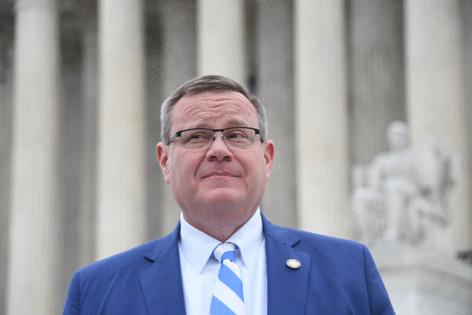North Carolinians to see a voter ID constitutional amendment on the 2026 ballot
Published in News & Features
RALEIGH, N.C. — As the year wraps up, taking with it the GOP’s legislative supermajority, Republican lawmakers in the North Carolina House passed a bill Wednesday to revise the state constitution’s language regarding voter identification.
The bill is not subject to the governor’s veto, so now that it has received a three-fifths majority vote in both the House and the Senate, voters will see it on their 2026 ballot.
If approved by voters, the proposed amendment would require all voters — not just those voting in person — to present photo identification before casting a ballot.
It will not immediately impact voters, since under current state law, they must already provide photo ID when voting in person on Election Day or during early voting. Those voting via absentee ballot must already include a copy of their photo ID with their ballot. The bill would make the language part of the constitution.
During a rules committee meeting Wednesday prior to the bill going to the floor, Rep. Grey Mills, a Republican from Iredell County, said the bill “is very straightforward” and does not change the election process or make any other changes, such as to forms of acceptable identification.
Katelin Kaiser, policy director of Democracy North Carolina, said the bill “is unnecessary” as state law already requires photo ID.
“This is another attempt to disenfranchise voters by mail, and it is working. Legislative leadership has made it more difficult for students, older people, and people who are disabled to vote by mail in North Carolina,” she said.
“We should be working on expanding voting access and ensuring every eligible voter can easily vote and have that ballot counted,” she said.
Other amendments
The voter ID bill had already been passed by the Senate, along with another amendment addressing income tax, which sought to modify the constitution to cap the maximum income tax rate at 5%.
Currently, the state constitution sets the cap at 7%, though the actual rate was 4.75% in 2023 and is set to drop to 4.5% in 2024.
Both amendments are sponsored by Senate Republicans, with Senate leader Phil Berger as one of the primary sponsors of the income tax amendment.
Prior iterations of these amendments — which did not go as far — were approved by voters but have been tied up in lawsuits. The unresolved lawsuits could become irrelevant if new amendments are approved in the 2024 elections.
Term limits for Congress
The House’s decision not to take up the Senate’s tax amendment comes a week after the Senate passed a bill pushed by House Republicans, regarding term limits for Congress.
The term limits proposal — which had as one of its primary sponsors House Speaker Tim Moore — had already been passed by the House and was also not subject to a gubernatorial veto.
However, it would require approval from other states and would likely face a lengthy process before being incorporated into the U.S. Constitution.
This week is expected to be the last working session of the legislature, meaning any further legislation would likely come next year, in which the GOP will keep hold of its majority but appears to have lost its supermajority by just one seat. This will mean it’ll require unity within its party, as well as buy-in from some Democrats.
_____
©2024 The News & Observer. Visit at newsobserver.com. Distributed at Tribune Content Agency, LLC.







Comments